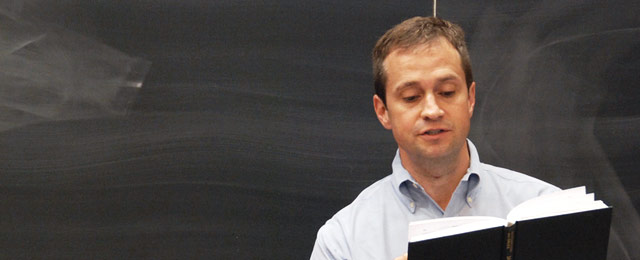Milton

This class is a study of Milton’s poetry, with attention paid to his literary sources, his contemporaries, his controversial prose, and his decisive influence on the course of English poetry. Throughout the course, Professor Rogers explores the advantages and limitations of a diverse range of interpretive techniques and theoretical concerns in Milton scholarship and criticism. Lectures include close readings of lyric and epic poetry, prose, and letters; biographical inquiries; examinations of historical and political contexts; and engagement with critical debates.
This Yale College course, taught on campus twice per week for 50 minutes, was recorded for Open Yale Courses in Fall 2007.Take this course for Yale College credit. John Rogers is teaching his course through the Yale Summer Online. This course runs from June 3 - July 5 and features extensive interaction with faculty and fellow students.http://summer.yale.edu/find-your-program/online-courses Click here to learn more and apply to this course.
Syllabus
This class is a study of Milton’s poetry, with attention paid to his literary sources, his contemporaries, his controversial prose, and his decisive influence on the course of English poetry. Throughout the course, Professor Rogers explores the advantages and limitations of a diverse range of interpretive techniques and theoretical concerns in Milton scholarship and criticism. Lectures include close readings of lyric and epic poetry, prose, and letters; biographical inquiries; examinations of historical and political contexts; and engagement with critical debates.
Hughes, Merritt, ed. John Milton. Complete Poems and Major Prose. Macmillan Publishing Company: New York, 1957.
The Holy Bible: King James Version (optional)
There will be a midterm (consisting of ten brief IDs of poetry, prose, names, and terms, drawn from all assigned material up to and including the first 55 lines of Paradise Lost, Book III), a final examination (2 hours long: short IDs and one longer thematic essay, covering the entire semester’s material), and two short papers (4-6pp. and 6-8pp.). In addition, students must attend a weekly discussion section.
The papers should be a close reading of a sonnet or a short passage (10-20 lines) from any poem read in the course. You are free to choose your focus, keeping in mind that this is an exercise in mining the riches of a small lode. Two particularly useful types of analysis would include: 1) a discussion of the workings and effect of a Miltonic allusion to a previous text, biblical, classical, or English; and 2) the ways in which Milton uses formal devices (e.g. rhyme, meter, enjambment) to create poetic meaning. All papers should be submitted to the TFs.
Midterm examination: 15%
Paper 1: 20%
Paper 2: 25%
Discussion section attendance and participation: 15%
Final examination: 25%
Sessions
| Lecture 1 | Introduction: Milton, Power, and the Power of Milton |
| Lecture 2 | The Infant Cry of God |
| Lecture 3 | Credible Employment |
| Lecture 5 | Poetry and Marriage |
| Lecture 6 | Lycidas |
| Lecture 8 | Areopagitica |
| Lecture 9 | Paradise Lost, Book I |
| Lecture 10 | God and Mammon: The Wealth of Literary Memory |
| Lecture 11 | The Miltonic Simile |
| Lecture 12 | The Blind Prophet |
| Exam 1 | Midterm Exam |
| Lecture 13 | Paradise Lost, Book III |
| Lecture 15 | Paradise Lost, Books V-VI |
| Lecture 16 | Paradise Lost, Books VII-VIII |
| Lecture 17 | Paradise Lost, Book IX |
| Lecture 19 | Paradise Lost, Books XI-XII |
| Lecture 18 | Paradise Lost, Books IX-X |
| Lecture 20 | Paradise Lost, Books XI-XII (cont.) |
| Lecture 21 | Paradise Regained, Books I-II |
| Lecture 22 | Paradise Regained, Books III-IV |
| Lecture 23 | Samson Agonistes |
| Lecture 24 | Samson Agonistes (cont.) |
| Exam 2 | Final Exam |